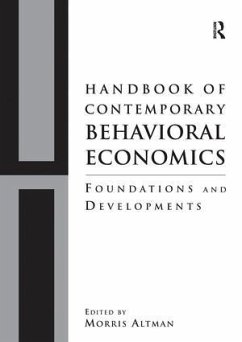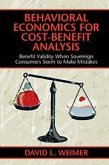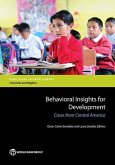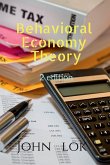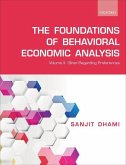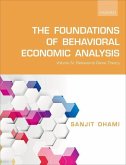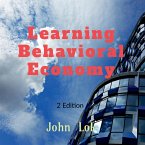- Broschiertes Buch
- Merkliste
- Auf die Merkliste
- Bewerten Bewerten
- Teilen
- Produkt teilen
- Produkterinnerung
- Produkterinnerung
Offering the comprehensive articulation of behavioral economics theory, this book includes coverage of critical areas such as the Economic Agent, Context and Modeling, Decision Making, Experiments and Implications, Labor Issues, Household and Family Issues, Life and Death, Taxation, Ethical Investment and Tipping, and more.
Andere Kunden interessierten sich auch für
![Behavioral Economics for Cost-Benefit Analysis Behavioral Economics for Cost-Benefit Analysis]() David L WeimerBehavioral Economics for Cost-Benefit Analysis36,99 €
David L WeimerBehavioral Economics for Cost-Benefit Analysis36,99 €![Behavioral Insights for Development Behavioral Insights for Development]() Behavioral Insights for Development35,99 €
Behavioral Insights for Development35,99 €![Behavioral Economy Theory 2 edition Behavioral Economy Theory 2 edition]() John LokBehavioral Economy Theory 2 edition19,99 €
John LokBehavioral Economy Theory 2 edition19,99 €![Workbook for McEachern's Contemporary Economics, 3rd Workbook for McEachern's Contemporary Economics, 3rd]() William A. MceachernWorkbook for McEachern's Contemporary Economics, 3rd42,99 €
William A. MceachernWorkbook for McEachern's Contemporary Economics, 3rd42,99 €![The Foundations of Behavioral Economic Analysis The Foundations of Behavioral Economic Analysis]() DhamiThe Foundations of Behavioral Economic Analysis39,99 €
DhamiThe Foundations of Behavioral Economic Analysis39,99 €![Foundations of Behavioral Economic Analysis Foundations of Behavioral Economic Analysis]() Sanjit DhamiFoundations of Behavioral Economic Analysis48,99 €
Sanjit DhamiFoundations of Behavioral Economic Analysis48,99 €![Learning Behavioral Economy Learning Behavioral Economy]() John LokLearning Behavioral Economy28,99 €
John LokLearning Behavioral Economy28,99 €-
-
-
Offering the comprehensive articulation of behavioral economics theory, this book includes coverage of critical areas such as the Economic Agent, Context and Modeling, Decision Making, Experiments and Implications, Labor Issues, Household and Family Issues, Life and Death, Taxation, Ethical Investment and Tipping, and more.
Produktdetails
- Produktdetails
- Verlag: Taylor & Francis
- Seitenzahl: 784
- Erscheinungstermin: 26. August 2016
- Englisch
- Abmessung: 246mm x 172mm x 45mm
- Gewicht: 1362g
- ISBN-13: 9781138953208
- ISBN-10: 1138953202
- Artikelnr.: 43153839
- Herstellerkennzeichnung
- Libri GmbH
- Europaallee 1
- 36244 Bad Hersfeld
- gpsr@libri.de
- Verlag: Taylor & Francis
- Seitenzahl: 784
- Erscheinungstermin: 26. August 2016
- Englisch
- Abmessung: 246mm x 172mm x 45mm
- Gewicht: 1362g
- ISBN-13: 9781138953208
- ISBN-10: 1138953202
- Artikelnr.: 43153839
- Herstellerkennzeichnung
- Libri GmbH
- Europaallee 1
- 36244 Bad Hersfeld
- gpsr@libri.de
Morris Altman received his Ph.D. in economics from McGill University. He is a former visiting scholar at Cornell, Duke, Hebrew, and Stanford universities, is professor and head of the Department of Economics at the University of Saskatchewan, and is an elected fellow of the World Innovation Foundation (WIF). He is president of the Society for Advancement of Behavioral Economics (SABE) and is editor of the Journal of Socio-Economics. Altman has published more than seventy scholarly papers in behavioral economics, economic history, institutional economics, and empirical macroeconomics. He has also published Human Agency and Material Welfare: Revisions in Microeconomics and Their Implications for Public Policy (1996) and Worker Satis[1]faction and Economic Performance (2001) and is currently completing two other books, one related to behavioral labor and the other to behavioral growth theory. He is also currently writing on issues related to economics and ethics, choice behavior, human and labor rights and growth, and the methodologies underlying behavioral economics.
Introduction Part 1: Inside the Economic Agent 1. Inside Economic Man:
Behavioral Economics and Consumer Behavior 2. Physiology and Behavioral
Economics: The New Findings from Evolutionary Neuroscience 3. Intuition in
Behavioral Economics 4. Introspective Economics: Broadening Psychology's
Reach 5. Integrating Emotions into Economic Theory 6. On the Economics of
Subselves: Toward a Metaeconomics Part 2: Context and Modeling 7. What a
Difference an Assumption Makes: Effort Discretion, Economic Theory, and
Public Policy 8. Group Selection and Behavioral Economics 9. Beliefs in
Behavioral and Neoclassical Economics 10. Reclaiming Moral Sentiments:
Behavioral Economics and the Ethical Foundations of Capitalism 11. Bounded
Rationality: Two Interpretations from Psychology 12. Behavioral Versus
Neoclassical Economics: Paradigm Shift or Generalization? 13.
Organizational Capital and Personal Capital: The Role of Intangible Capital
Formation in the Economy Part 3: Decision Making 14. How to Do As Well As
You Can: The Psychology of Economic Behavior and Behavioral Ecology 15.
Discounting, Self-Control, and Saving 16. Rational Choice Theory Versus
Cultural Theory: On Taste and Social Capital 17. Deliberation Cost as a
Foundation for Behavioral Economics 18. In-Depth Interviews as a Means of
Understanding Economic Reasoning: Decision Making as Explained by Business
Leaders and Business Economists Part 4: Experiments and Implications 19.
Classroom Experiments in Behavioral Economics 20. A Behavioral Approach to
Distribution and Bargaining 21. The Context, or Reference, Dependence of
Economic Values: Further Evidence and Some Predictable Patterns 22.
Experiments and Behavioral Economics Part 5: Labor-Related Issues 23.
Behavioral Labor Economics 24. Hours of Labor Supply: A More Flexible
Approach Part 6: Gender and Decision Making 25. Chicks, Hawks, and
Patriarchal Institutions 26. Economic Decisions in the Private Household
Part 7: Life and Death 27. A Prolegomenon to Behavioral Economic Studies of
Suicide 28. Rational Health-Compromising Behavior and Economic Intervention
Part 8: Taxation, Ethical Investment, and Tipping 29. Taxation and the
Contribution of Behavioral Economics 30. Ethical Investing: Where Are We
Now? 31. Tipping in Restaurants and Around the Globe: An Interdisciplinary
Review Part 9: Development, Behavioral Law, and Money 32. Economic
Development, Equality, Income Distribution, and Ethics 33. Insufficient
Social Capital and Economic Underdevelopment Hamid Hosseini 34. Behavioral
Law and Economics: An Introduction 35. Elements of Behavioral Monetary
Economics 36. Behavioral Finance
Behavioral Economics and Consumer Behavior 2. Physiology and Behavioral
Economics: The New Findings from Evolutionary Neuroscience 3. Intuition in
Behavioral Economics 4. Introspective Economics: Broadening Psychology's
Reach 5. Integrating Emotions into Economic Theory 6. On the Economics of
Subselves: Toward a Metaeconomics Part 2: Context and Modeling 7. What a
Difference an Assumption Makes: Effort Discretion, Economic Theory, and
Public Policy 8. Group Selection and Behavioral Economics 9. Beliefs in
Behavioral and Neoclassical Economics 10. Reclaiming Moral Sentiments:
Behavioral Economics and the Ethical Foundations of Capitalism 11. Bounded
Rationality: Two Interpretations from Psychology 12. Behavioral Versus
Neoclassical Economics: Paradigm Shift or Generalization? 13.
Organizational Capital and Personal Capital: The Role of Intangible Capital
Formation in the Economy Part 3: Decision Making 14. How to Do As Well As
You Can: The Psychology of Economic Behavior and Behavioral Ecology 15.
Discounting, Self-Control, and Saving 16. Rational Choice Theory Versus
Cultural Theory: On Taste and Social Capital 17. Deliberation Cost as a
Foundation for Behavioral Economics 18. In-Depth Interviews as a Means of
Understanding Economic Reasoning: Decision Making as Explained by Business
Leaders and Business Economists Part 4: Experiments and Implications 19.
Classroom Experiments in Behavioral Economics 20. A Behavioral Approach to
Distribution and Bargaining 21. The Context, or Reference, Dependence of
Economic Values: Further Evidence and Some Predictable Patterns 22.
Experiments and Behavioral Economics Part 5: Labor-Related Issues 23.
Behavioral Labor Economics 24. Hours of Labor Supply: A More Flexible
Approach Part 6: Gender and Decision Making 25. Chicks, Hawks, and
Patriarchal Institutions 26. Economic Decisions in the Private Household
Part 7: Life and Death 27. A Prolegomenon to Behavioral Economic Studies of
Suicide 28. Rational Health-Compromising Behavior and Economic Intervention
Part 8: Taxation, Ethical Investment, and Tipping 29. Taxation and the
Contribution of Behavioral Economics 30. Ethical Investing: Where Are We
Now? 31. Tipping in Restaurants and Around the Globe: An Interdisciplinary
Review Part 9: Development, Behavioral Law, and Money 32. Economic
Development, Equality, Income Distribution, and Ethics 33. Insufficient
Social Capital and Economic Underdevelopment Hamid Hosseini 34. Behavioral
Law and Economics: An Introduction 35. Elements of Behavioral Monetary
Economics 36. Behavioral Finance
Introduction Part 1: Inside the Economic Agent 1. Inside Economic Man:
Behavioral Economics and Consumer Behavior 2. Physiology and Behavioral
Economics: The New Findings from Evolutionary Neuroscience 3. Intuition in
Behavioral Economics 4. Introspective Economics: Broadening Psychology's
Reach 5. Integrating Emotions into Economic Theory 6. On the Economics of
Subselves: Toward a Metaeconomics Part 2: Context and Modeling 7. What a
Difference an Assumption Makes: Effort Discretion, Economic Theory, and
Public Policy 8. Group Selection and Behavioral Economics 9. Beliefs in
Behavioral and Neoclassical Economics 10. Reclaiming Moral Sentiments:
Behavioral Economics and the Ethical Foundations of Capitalism 11. Bounded
Rationality: Two Interpretations from Psychology 12. Behavioral Versus
Neoclassical Economics: Paradigm Shift or Generalization? 13.
Organizational Capital and Personal Capital: The Role of Intangible Capital
Formation in the Economy Part 3: Decision Making 14. How to Do As Well As
You Can: The Psychology of Economic Behavior and Behavioral Ecology 15.
Discounting, Self-Control, and Saving 16. Rational Choice Theory Versus
Cultural Theory: On Taste and Social Capital 17. Deliberation Cost as a
Foundation for Behavioral Economics 18. In-Depth Interviews as a Means of
Understanding Economic Reasoning: Decision Making as Explained by Business
Leaders and Business Economists Part 4: Experiments and Implications 19.
Classroom Experiments in Behavioral Economics 20. A Behavioral Approach to
Distribution and Bargaining 21. The Context, or Reference, Dependence of
Economic Values: Further Evidence and Some Predictable Patterns 22.
Experiments and Behavioral Economics Part 5: Labor-Related Issues 23.
Behavioral Labor Economics 24. Hours of Labor Supply: A More Flexible
Approach Part 6: Gender and Decision Making 25. Chicks, Hawks, and
Patriarchal Institutions 26. Economic Decisions in the Private Household
Part 7: Life and Death 27. A Prolegomenon to Behavioral Economic Studies of
Suicide 28. Rational Health-Compromising Behavior and Economic Intervention
Part 8: Taxation, Ethical Investment, and Tipping 29. Taxation and the
Contribution of Behavioral Economics 30. Ethical Investing: Where Are We
Now? 31. Tipping in Restaurants and Around the Globe: An Interdisciplinary
Review Part 9: Development, Behavioral Law, and Money 32. Economic
Development, Equality, Income Distribution, and Ethics 33. Insufficient
Social Capital and Economic Underdevelopment Hamid Hosseini 34. Behavioral
Law and Economics: An Introduction 35. Elements of Behavioral Monetary
Economics 36. Behavioral Finance
Behavioral Economics and Consumer Behavior 2. Physiology and Behavioral
Economics: The New Findings from Evolutionary Neuroscience 3. Intuition in
Behavioral Economics 4. Introspective Economics: Broadening Psychology's
Reach 5. Integrating Emotions into Economic Theory 6. On the Economics of
Subselves: Toward a Metaeconomics Part 2: Context and Modeling 7. What a
Difference an Assumption Makes: Effort Discretion, Economic Theory, and
Public Policy 8. Group Selection and Behavioral Economics 9. Beliefs in
Behavioral and Neoclassical Economics 10. Reclaiming Moral Sentiments:
Behavioral Economics and the Ethical Foundations of Capitalism 11. Bounded
Rationality: Two Interpretations from Psychology 12. Behavioral Versus
Neoclassical Economics: Paradigm Shift or Generalization? 13.
Organizational Capital and Personal Capital: The Role of Intangible Capital
Formation in the Economy Part 3: Decision Making 14. How to Do As Well As
You Can: The Psychology of Economic Behavior and Behavioral Ecology 15.
Discounting, Self-Control, and Saving 16. Rational Choice Theory Versus
Cultural Theory: On Taste and Social Capital 17. Deliberation Cost as a
Foundation for Behavioral Economics 18. In-Depth Interviews as a Means of
Understanding Economic Reasoning: Decision Making as Explained by Business
Leaders and Business Economists Part 4: Experiments and Implications 19.
Classroom Experiments in Behavioral Economics 20. A Behavioral Approach to
Distribution and Bargaining 21. The Context, or Reference, Dependence of
Economic Values: Further Evidence and Some Predictable Patterns 22.
Experiments and Behavioral Economics Part 5: Labor-Related Issues 23.
Behavioral Labor Economics 24. Hours of Labor Supply: A More Flexible
Approach Part 6: Gender and Decision Making 25. Chicks, Hawks, and
Patriarchal Institutions 26. Economic Decisions in the Private Household
Part 7: Life and Death 27. A Prolegomenon to Behavioral Economic Studies of
Suicide 28. Rational Health-Compromising Behavior and Economic Intervention
Part 8: Taxation, Ethical Investment, and Tipping 29. Taxation and the
Contribution of Behavioral Economics 30. Ethical Investing: Where Are We
Now? 31. Tipping in Restaurants and Around the Globe: An Interdisciplinary
Review Part 9: Development, Behavioral Law, and Money 32. Economic
Development, Equality, Income Distribution, and Ethics 33. Insufficient
Social Capital and Economic Underdevelopment Hamid Hosseini 34. Behavioral
Law and Economics: An Introduction 35. Elements of Behavioral Monetary
Economics 36. Behavioral Finance

